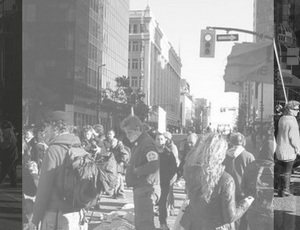
JU Institute of Sociology invites you to attend a lecture by Dr Tamara Caraus, entitled "Where does radicalism go when it disappears? The radical cosmopolitical potential of migrant activism and its re-enacting of the nation-state", which will be held on 18 January 2018 at 6.00 p.m.
The lecture will address a paradox of migrant protests and resistance, such as Sans Papiers, No One Is Illegal, No Borders, migrant protests related to Lampedusa and Calais camps, and other migrant protests from the last decade. Migrant protests are radical both at the level of ‘ideational content’, which is expressed by statements such as ‘No one is illegal’, ‘No borders, no nations’ and ‘Papers for all or not papers at all', as well as at the level of morphology of protests: through occupation of public spaces, marches, blockades, hunger strikes, etc. Through these actions, which are considered 'illegal', migrants act as if they already have universal and equal rights. Although migrant activism is radical, since it is contesting the foundations of the current world order of the nation-states, at the same time migrants end up requesting rights, admission and citizenship in one concrete nation-state or another. Citizenship is both the form of exclusion which they are protesting against and the goal which many immigrant protesters are striving to achieve. Therefore, migrant activism is influenced by the logic and practices of state sovereignty and ends up re-inscribing existing political arrangements. That failure is not of migrant activism itself – its radicalism “disappears” in the methodological nationalism that structures the theoretical and practical approaches of migration. The lecture will discuss how reluctance to abandon methodological nationalism perpetuates the problems posed by the question of migration as well as argue that this paradox of migrant activism shows the necessity to bring back the idea of global citizenship and/or world government as a necessary component of political theory of migration.
Dr Tamara Caraus is a researcher at the Research Institute of the University of Bucharest. Her current area of research includes political theory of cosmopolitanism, global protests and resistance, migrant activism, radical democracy and critical theory of work. Previously, She has undertaken research projects in political philosophy at the University of Rijeka, Croatia; Institut fur die Wissenschaften vom Menschen, Vienna, Austria; University of Uppsala, Sweden; the University of Groningen, The Netherland; Oxford University, UK; Palacky University of Olomouc, Czech Republic and other institutions. Dr Caraus was the Principal Investigator within the team research project Critical Foundations of Contemporary Cosmopolitanism (2011-2014) at New Europe College, Bucharest. She contributed with articles to various academic journals and edited volumes, published Tzara mea (2001), Ethical Perspectives on the Postmodern Rewriting (2003), Traps of Identity (2011), The Paper Language (2017) and coedited Cosmopolitanism and the Legacy of Dissent (Routledge, 2014), Re-Grounding Cosmopolitanism: Towards a Post-Foundational Cosmopolitanism (Routledge, 2015); Cosmopolitanism Without Foundations (Zeta Books, 2015); Cosmopolitanism and Global Protests: Special Issue of Globalizations (Taylor &Francis Journal, 2017).

